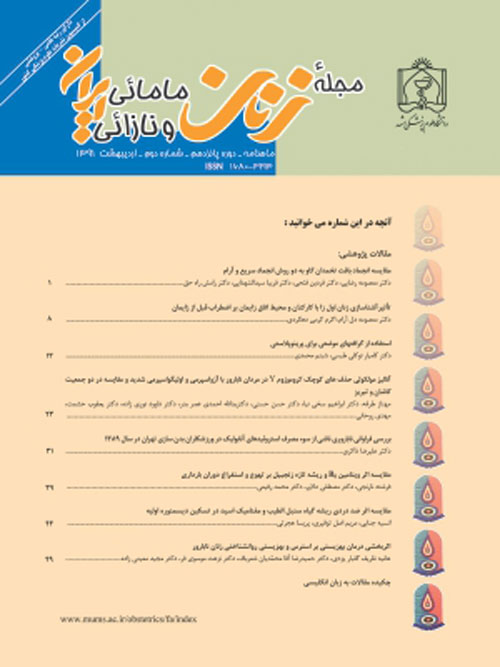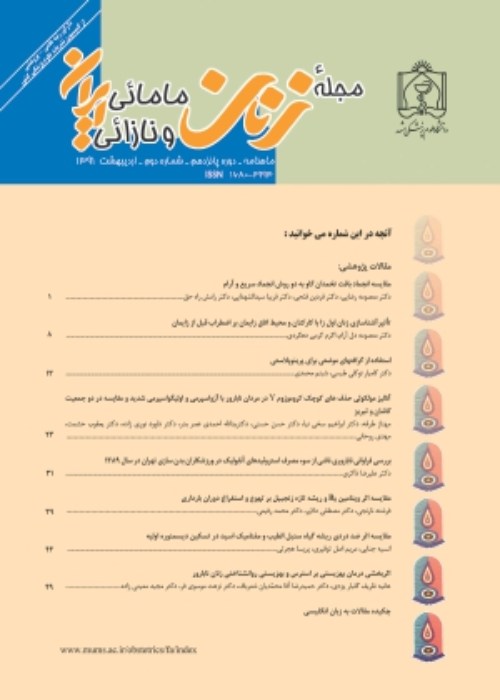فهرست مطالب

مجله زنان مامائی و نازائی ایران
سال نوزدهم شماره 196 (هفته سوم خرداد 1395)
- تاریخ انتشار: 1395/03/19
- تعداد عناوین: 3
-
- اصیل پژوهشی
-
صفحات 1-10مقدمهزایمان زودرس، عامل اصلی مرگ و میر و بیماری های دوران نوزادی می باشد. با توجه به اینکه تاثیر آرام سازی پیشرونده عضلانی بر وقوع زایمان زودرس زنان باردار به اندازه کافی مورد توجه قرار نگرفته است، لذا مطالعه حاضر با هدف ارزیابی تاثیر آرام سازی پیشرونده عضلانی بر وقوع زایمان زودرس در زنان نخست باردار شهر همدان انجام شد.روش کاراین مطالعه کارآزمایی بالینی در سال 1394 بر روی 120 زن نخست باردار در هفته 22-21 بارداری در شهر همدان انجام شد. افراد ابتدا پرسشنامه اطلاعات فردی و پرسشنامه اضطراب اسپیل برگر را تکمیل کردند و به صورت تصادفی به دو گروه 60 نفره کنترل و مداخله تقسیم شدند. گروه کنترل فقط مراقبت های معمول را دریافت کردند، اما گروه مداخله علاوه بر مراقبت های معمول، پس از فراگیری تکنیک آرام سازی عضلانی، به مدت 10 هفته این تمرینات را در منزل انجام دادند و برگه ثبت عملکرد روزانه را تکمیل کردند و تا هفته 32 بارداری از نظر وقوع زایمان زودرس پیگیری شدند. تجزیه و تحلیل داده ها با استفاده از نرم افزار آماریSPSS (نسخه 20) و آزمون های تی تست، کای اسکوئر و تحلیل کوواریانس انجام شد. میزان p کمتر از 05/0 معنی دار در نظر گرفته شد.یافته هادو گروه قبل از مداخله از نظر سطوح اضطراب آشکار و پنهان همگن بودند، اما پس از مداخله در گروه کنترل افزایش معنادار (001/0>p) و در گروه آزمون کاهش معناداری (001/0>p) در میانگین اضطراب آشکار و پنهان مشاهده شد. همچنین در گروه کنترل زایمان زودرس به طور معناداری بیشتر از گروه مداخله رخ داده بود (04/0=p).نتیجه گیریآموزش تکنیک آرام سازی پیشرونده عضلانی به زنان باردار می تواند تاثیر بسزایی بر کاهش اضطراب و کاهش وقوع زایمان زودرس داشته باشد.کلیدواژگان: آرام سازی پیشرونده عضلانی، اضطراب، بارداری، زایمان زودرس
-
صفحات 11-17مقدمهبارداری ناخواسته یک مشکل عمومی و جهانی است که باعث بروز مشکلات جسمی، روانی و اقتصادی در مادر می شود. خطر افزایش سقط جنین، زایمان زودرس و تولد نوزادان کم وزن در این زنان بالاتر است. همچنین این مادران در مورد مراقبت های دوران بارداری کوتاهی کرده که علاوه بر کاهش وزن و سن هنگام تولد، این کودکان بیشتر در معرض بیماری، مرگ و میر و سوء رفتار قرار خواهند گرفت. لذا مطالعه حاضر با هدف مقایسه شاخص های رشد شیرخواران در دو گروه با حاملگی خواسته و ناخواسته انجام شد.روش کاراین مطالعه توصیفی - تحلیلی (کوهورت آینده نگر) در سال 94-1393 بر روی 1000 نفر از زنان باردار مراجعه کننده به مراکز بهداشتی درمانی سطح شهر سنندج انجام شد. ابزار گردآوری داده ها شامل پرسشنامه بود که با مصاحبه با مادران تکمیل شد و شاخص های رشد شیرخواران با کمک ترازوی استاندارد، متر و قدسنج اندازه گیری شد. تجزیه و تحلیل داده ها با استفاده از نرم افزار آماری SPSS (نسخه 20) و آزمون های تی تست و کای دو انجام شد. میزان p کمتر از 01/0 معنی دار در نظر گرفته شد.یافته هامیانگین شاخص های رشد شیرخواران (وزن، قد و دور سر) در بدو تولد، 2، 4 و 6 ماهگی در گروه حاملگی ناخواسته به طور معنی داری کمتر از گروه شاهد بود (000/0=p). بر اساس آزمون تی تست، تفاوت آماری معناداری در مورد شاخص های رشد نوزادان (وزن، قد و دور سر) در دو گروه با حاملگی خواسته و ناخواسته در بدو تولد، 2 ، 4 و 6 ماهگی در نوزادان وجود داشت (01/0>p).نتیجه گیریبارداری ناخواسته بر روی شاخص های رشد نوزادان تاثیر دارد و موجب کاهش رشد در نوزادان می شود. همچنین مادران با بارداری ناخواسته بیشتر زایمان طبیعی و زایمان زودرس دارند.کلیدواژگان: بارداری، رشد، ناخواسته، نوزاد
- گزارش مورد
-
صفحات 18-30مقدمهسندرم پیش از قاعدگی، یکی از شایع ترین اختلالات سنین باروری است که زنان برای رها شدن از آن به درمان های طبیعی یا طب مکمل روی می آورند. ارائه دهندگان سلامت در راستای کمک به زنان در جهت تصمیم گیری مناسب برای انتخاب بهترین درمان جایگزین و مبتنی بر شواهد، به اطلاعات با کیفیت و مناسب نیاز دارند.مطالعه حاضر با هدف بررسی کارآزمایی های بالینی انجام شده در ارتباط با داروهای گیاهی و جایگزین برای درمان سندرم پیش از قاعدگی در ایران و تحلیل اثربخشی آن ها در کاهش شدت علائم سندرم قبل از قاعدگی انجام شد.روش کاردر این مطالعه تعداد 42 کار آزمایی بالینی به طریق جستجو در پایگاه های الکترونیکی SID، Pubmed، Google scholar و Science direct و همچنین جستجوی دستی در کتاب و پایان نامه های دانشجویی از بهمن ماه سال 1393 با استفاده از کلمات کلیدی سندرم پیش از قاعدگی، داروهای گیاهی و طب مکمل و واژه های لاتین Premenstrual syndrome، PMS، herbal medicine، complementary medicine و alternative medicine یافت شد. مقالات انگلیسی زبان از سال 2005 تا 2016 و مقالات فارسی از سال 1389 به بعد مورد بررسی قرار گرفتند.یافته هادر این مطالعه تعداد 11 نوع مختلف گیاهان دارویی در 42 مطالعه کارآزمایی بالینی که دارای معیار ورود به مطالعه بودند مورد بررسی قرار گرفتند. اکثر گیاهان دارویی بررسی شده در مقالات دارای ترکیبات آنتی اکسیدانی، فلاونوئیدی با خاصیت ضد التهاب و ضد درد بوده و در تسکین علائم PMS تاثیر مطلوبی داشتند. اکثریت این گیاهان فاقد عوارض جانبی یا دارای حداقل عوارض بودند، به دلیل اینکه متدولوژی مطالعات از نظر کیفیت ناهمگون بود، لذا امکان انجام متاآنالیز وجود نداشت.نتیجه گیرینتایج مطالعات نشان دهنده کاهش شدت علائم سندرم پیش از قاعدگی با استفاده از داروهای گیاهی چون ویتاگنوس، گل مغربی، بابونه، جوانه گندم، اسطوخودوس، خوشاریزه، سنبل الطیب، اسانس پوست پرتقال و زنجبیل بود.کلیدواژگان: سندرم قبل از قاعدگی، طب جایگزین، کارآزمایی بالینی، گیاهان دارویی
-
Pages 1-10IntroductionPreterm delivery is the main cause of mortality and neonatal diseases. Since the effect of progressive muscle relaxation on preterm delivery in pregnant women has not been paid enough attention, therefore, this study was performed with aim to evaluate the effect of progressive muscle relaxation on preterm delivery of primigravida women referred to health care centers in Hamadan.MethodsThis clinical trial study was performed on 120 primigravida women at 21-22 gestational week in Hamadan in 2015. At first, the subjects completed demographic questionnaire and Spielberger questionnaire and were randomly assigned to intervention and control groups (60 women in each group). The control group only received routine prenatal care, but experimental group in addition to routine prenatal care, learned muscle relaxation techniques and performed these exercises at home for 10 weeks, and completed daily performance sheet and were followed up to 32 weeks of gestation in terms of preterm delivery. Data were analyzed by SPSS software (version 20), and t-test, Chi-square, and covariance analysis.ResultsTwo groups were homogenous in terms of state and trait anxiety levels before the intervention, but after the intervention, state and trait anxiety in the control group was significantly increased (PConclusionTeaching progressive muscle relaxation techniques to pregnant women can have a significant impact on reducing anxiety and preterm delivery.Keywords: Anxiety, Pregnancy, Preterm delivery, Progressive muscle relaxation
-
Pages 11-17IntroductionUnwanted pregnancy is a general and universal problem which causes physical, mental and economic problems for mother. The increased risk of miscarriage, premature delivery and low birth weight infants is higher in these women. These mothers neglect about prenatal care that in addition to low birth weight and short gestational age at birth, these neonates are more susceptible to illness, mortality, and misconduct.Therefore, this study was performed with aim to compare infant's growth indicators in two groups of wanted and unwanted pregnancy.MethodsThis descriptive-analytic study (prospective cohort) was performed on 1000 pregnant women referred to health centers of Sanandaj from 2014 to 2015. Data collection tool was a questionnaire which was completed by interviews with mothers and infant's growth indicators were measured with standard scales, meter, and stadiometer. Data was analyzed by SPSS software (version 20), and T- test and Chi-square test.ResultsMean growth indicators of infants (weight, height and head circumference) at birth, 2, 4 and 6 months was significantly lower in case group than control group (P= 0.000).Based on t-test, there was statistically significant differences between wanted and unwanted pregnancy groups in terms of infant's growth indicators (weight, height and head circumference) at birth, 2, 4 and 6 months (PConclusionUnwanted pregnancy affects infant's growth indicators and reduces growth in newborns. Also, women with unwanted pregnancy have more normal vaginal delivery and preterm birth.Keywords: Growth, Infant, Pregnancy, Unwanted
-
Pages 18-30IntroductionPremenstrual syndrome is one of the most common disorder of reproductive age. Women turns to natural remedies or complementary medicine to get rid of it. Health providers need to appropriate information in order to help women to choose the best alternative based on evidences. This study was performed with aim to evaluate the clinical trials which are performed about herbal and alternative remedies for treatment of premenstrual syndrome in Iran and the analysis of their effectiveness on reducing the symptoms of premenstrual syndrome.MethodsIn this study, 42 clinical trials were found through searching in electronic databases of SID, PubMed, Google scholar, Science direct and also searching in books and student thesis from February 2014 and using the key words including; Alternative medicine, Herbal medicine, Premenstrual syndrome, PMS, and Complementary medicine. The English articles from 2005 to 2016 and the Persian ones from 2010 were studied.ResultsIn this study, 11 different types of medicinal plants in 42 clinical trials which met the inclusion criteria were evaluated. Most herbs have been studied in articles antioxidant compounds, flavonoids with anti-inflammatory and analgesic properties and had a favorable impact in relieving PMS. Most of the plants had antioxidant compounds, flavonoids with anti-inflammation and anti-pain characteristics and were effective in relieving the symptoms of PMS. Most of these plants had any side-effects or had minimal complications. Since the methodology of the studies were heterogeneous in terms of quality, so there was no possibility of conducting meta-analysis.ConclusionThe results of studies indicate the reduction in the severity of premenstrual syndrome symptoms using herbal medicines such as Vitagnus, Evening Primrose oil, chamomile, wheat germ, lavender, Echinophora-platyloba, valerian, orange peel and ginger.Keywords: Alternative medicine, Clinical trials, Herbal medicine, Premenstrual syndrome


